Book Digest: February 11, 2008
The proliferation of journals unfortunately referred to as “blogs” has naturally led to a burgeoning bibliography dedicated to pointing out the coincidence of the decline of civilization and the rise of weblogs. Sara Boxer, who wrote Ultimate Blogs: Masterworks From the Wild Web about which she confesses, “Two years ago, I was given a dreadful idea for a book: create an anthology of blogs. It could not be done, I was sure…” has written a useful piece about blogs.
Although I find that I don’t have as much time as I’d like to look at literary websites, here are some you might find helpful or interesting: wood s lot, Chekhov’s Mistress, The Reading Experience, Golden Rule Jones, Maud Newton, The Literary Saloon, Edward Champion’s Filthy Habits, Emerging Writers Network, The Elegant Variation, Bookdwarf, and Confessions of an Idiosyncratic Mind.
Breaking the Mode: Contemporary Fashion From the Collection of… by Sharon S. Takeda and Kaye D. Spilker
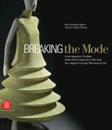
The world of fashion is divisible into two sets—one to do with the baser elements of human activity and the other about creation and originality and—dare I say it—beauty. While fine-arts museums have, almost from their inception, considered textiles and costumes within their purview and included them in their collections, only in the last 50 years has fashion risen to the stature of fine art. This monograph stems from an exhibition that the Los Angeles County Museum of Art constructed in late 2006 and early 2007 to show its contemporary clothing collection as assembled by curators Spilker and Takeda. As befits cutting-edge fashion, there is a heavy tilt toward Kawakubo, Miyake, Moschino, Lacroix, McQueen, Westwood, and Mugler.
» See images from Breaking the Mode
Frank Lloyd Wright Mid-Century Modern by Alan Hess
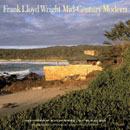
I’ve never grown tired of looking at and admiring Frank Lloyd Wright’s architectural wonders, and so this volume is a welcome addition to the Wright bibliography. Especially as it focuses on the fertile period when he created the Guggenheim Museum, Price Tower, Fallingwater, and the Usonian houses. The ‘50s were also a time when Wright branched off into furniture and various objets d’art.
Island of My Hunger: Cuban Poetry Today edited by Francisco Morán

Not that you would be familiar with the authors—Norge Espinosa, Omar Perez, Alessandra Molina, Antonio Jose Ponte, Soleida Rios, Felix Lizarraga, German Guerra, and Reina Maria Rodriguez—but that’s who’s included in this bilingual anthology, the point of which is to make available to us yanquis the freshest voices from a new generation of Cuban poets.
I Was Cuba: Treasures From the Ramiro Fernandez Collection by Kevin Kwan
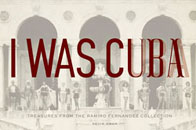
Even an occasional visitor to the Book Digest might understand that I have a fascination with all things Cuban. This book draws on Ramiro Fernandez’s extensive, well-regarded collection of images and miscellany of Cuba. Includes an interview with book designer Kwan by People en Español editor Peter Castro (no relation).
» See images from I Was Cuba
Charlatan: America’s Most Dangerous Huckster, the Man Who Pursued Him, and the Age of Flimflam by Pope Brock

Americans never cease to be fascinated with the snake-oil salesmen, imposters, and charlatans that seem to be a byproduct of our great free-market system. With brio and clarity Brock tells the true story of the rise of conman John R. Brinkley who, using a goat-gland implant surgery, claimed the restoration of sexual potency. “Dr.” Brinkley prospered, despite the best efforts of quack-buster Morris Fishbein, who spent years trying to unmask the phony medicine man. After buying a powerful radio station in Mexico to hawk his wares, Brinkley, in addition to wreaking havoc on multitudes of patients, introduced a number of broadcasting innovations and brought country music and blues to the airwaves.
» Read an excerpt from Charlatan
The Best American Erotic Poems: From 1800 to the Present edited by David Lehman

Apparently there a few titles that Houghton Mifflin hasn’t expropriated for its “Best American” series. Lehman, who edits Scribner’s Best American Poetry annuals, anthologizes a few hundred years of American poetic eroticism—from Francis Scott Key, Emily Dickinson, Walt Whitman, and Hart Crane to Frank O’Hara, Anne Sexton, John Updike, Charles Simic, Billy Collins, Kevin Young, Sharon Olds, Sarah Manguso, Ravi Shankar, and Brenda Shaughnessy. Additionally, Lehman has included a section of poets testifying on their personal favorite erotic works. For those of you in New York there is a reading from this tome on Monday night at the Museum of Sex.
Everything Lost: The Latin American Notebook of William S. Burroughs edited by Geoffrey D. Smith, John M. Bennett, and Oliver Harris
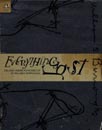
For renegades, misfits, and outcasts, Burroughs is worshipped both for his bizarre lifestyle and prescient insights. Assembled in facsimile, this book was written after a seven-month trek through the jungles of Ecuador, Colombia, and Peru in 1952-53, while on a search for a drug called Yage. Everything Lost includes Burroughs’s ruminations on the preceding four years he spent in South America—during which time his first novel, Junkie, was published, he shot and killed his wife Joan Vollmer (during a drugged-out, William Tell scenario), and other miscellaneous and sundry misadventures. Burroughs was an authentic American original and any doubts on that should be quelled by this journal.
» Read an excerpt [pdf] from Everything Lost
The Notebooks of Robert Frost edited by Robert Faggen

Crusty Yankee poet Frost had already achieved a measure of stature (as much as poets might in this decidedly poet-unfriendly culture) when John F. Kennedy assured him of preeminence by including him in the 1960 presidential inauguration. What good American is oblivious of Frost’s The Road Not Taken or would not mention him when asked to name an American poet? Frost scholar Faggen pored over and transcribed the poet’s voluminous notebooks (covering a 70-year period) and presents them in their entirety—annotated and cross-referenced. Faggen’s methodology and this book have come under fire, a squabble beyond our expertise or interest to resolve. You decide.
Predictably Irrational: The Hidden Forces That Shape Our Decisions by Dan Ariely

There seems to be a booming subgenre of books, exemplified by Freakonomics and The Tipping Point, devoted to investigating various anomalies and disconnections of contemporary human behavior, both social and individual. M.I.T. behavioral economist Ariely argues that we don’t behave in rational ways, and for examples he presents a familiar litany of inconsistencies and contradictory behavior that seems to be a staple of cocktail-party chatter or water-cooler banter. Which is to say: The thesis is not surprising and the examples, anecdotes, and research spawned are more or less interesting, such as: “Why do we go back for second helpings at the unlimited buffet, even when our stomachs are already full?” Or: “How did we ever start spending $4.15 on a cup of coffee when, just a few years ago, we used to pay less than a dollar?”
» Read an excerpt from Predictably Irrational
The Best of the Bellvue Literary Review edited by Danielle Deri

I was not aware that Bellevue Hospital, the oldest public hospital in the United States, had created the Bellevue Literary Review (published by the Department of Medicine at New York University) for the purpose of having a forum for illuminating humanity and human experience. But I am pleased to learn of it. This anthology includes Julia Alvarez,Rafael Campo, Rick Moody, and Abraham Verghese, with an introduction by Sherwin Nuland.
The Jewish Messiah by Arnon Grunberg, translated by Sam Garrett

No doubt it is a burden to wear the twin mantles of literary wunderkind and enfant terrible. It’s a burden that Grunberg continues to live up to in his eight variously award-winning novels. His latest rachets up the absurd—iconoclasm set in Switzerland, land of cuckoo clocks and financial crimes against humanity—featuring young Xavier Radek delving into his own Jewishness while discovering that his maternal grandfather was an SS officer. Donna Seaman concludes:
Now Grunberg—mocking and macabre, explicit and analytical, and clearly disgusted by the distortion of religion and philosophy to justify hate and violence—aims to outrage readers to awaken moral indignation. Internationally renowned, especially among younger readers—a standing fueled by his journalism, blog, and travels to Guantanamo and Afghanistan—Grunberg has as much talent as chutzpah and, beneath the absurdist vamping, a longing for justice, integrity, and hope.
A People’s History of American Empire by Howard Zinn, with Mike Konopaki and Paul Buhle

Recently I asked HowardZinn if there was a limit to the iterations and spinoffs of his masterpiece, A People’s History of the United States. He chuckled, offering what his lovely wife Rosyln, when she heard of this latest version, said: “Enough already, with the People’s History of this and the People’s History of that.” In any case, this is a wonderful graphic novelization—as Zinn says, they used to be called comic books—of his seminal work, weaving his own biography, You Can’t Be Neutral on a Moving Train, with his historical analysis from the bottom up, using the conceit of presenting Zinn’s views as if this were a post-9/11 lecture. Konopacki and Buhle do an admirable job synthesizing Zinn’s history as well designing a graphically compelling book that intermixes real pictures with the line drawings.
Gang Leader for a Day by Sudhir Venkatesh, read by Reg Rogers
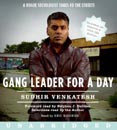
Audiobooks serve two functions for me: to give a different iteration or angle on a book I’ve already read, or to make easily accessible a book I would not, under normal circumstances, read. Venkatesh’s story falls into the latter case. Certainly it is an interesting and unusual story (made more interesting to me because it is set in the ghettos of my hometown, Chicago), in which Venkatesh, a sociology grad student, serendipitously gains unusually direct and frank access to a drug-dealing gang leader. He then spends the next seven years familiarizing himself with a varied assemblage of neighborhood dealers, crackheads, cops, activist squatters, prostitutes, pimps, organizers, and officials. In any case it’s a fascinating story in whatever form you choose to take it in.
» Listen to an excerpt from Gang Leader for a Day
